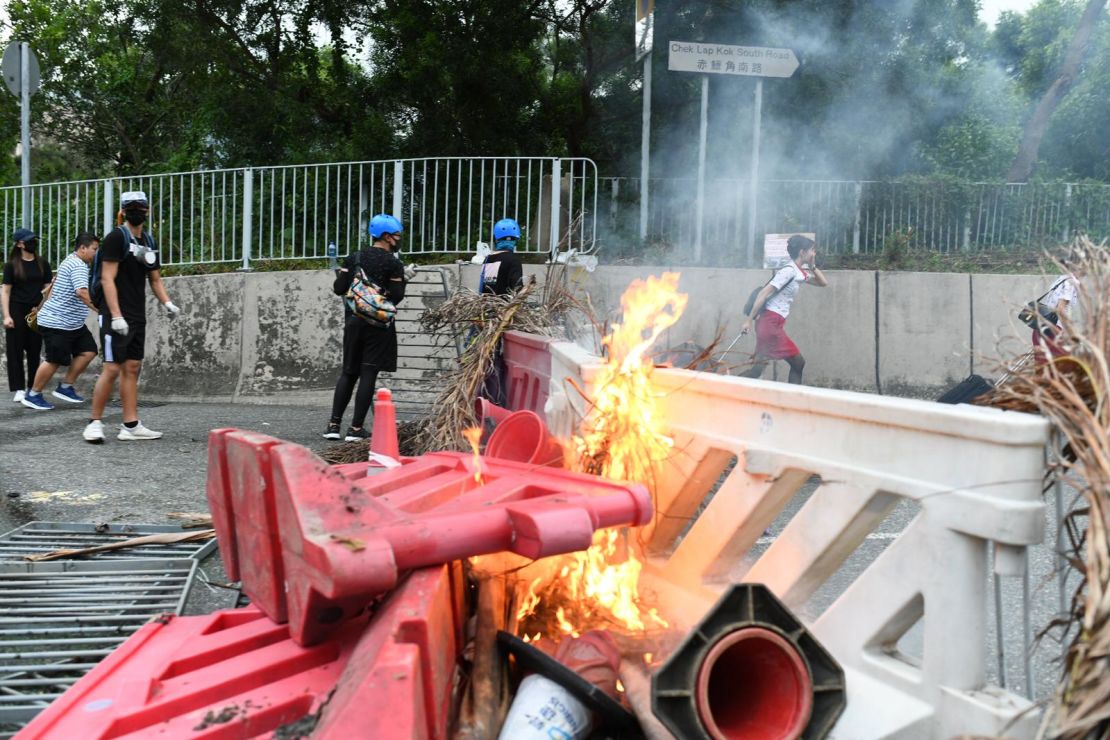Transport to and from Hong Kong International Airport was disrupted for hours Sunday as protesters barricaded roads, leaving traffic gridlocked and stranding hundreds of tourists at the terminal.
The protests followed a night of violent clashes with police Saturday, during which protesters threw petrol bombs and set fires and police responded with water cannon and tear gas. Police were also seen rushing into a subway station to make dozens of arrests.
It was the 13th consecutive weekend of protests in Hong Kong, concluding days of escalation in which a number of activist leaders and lawmakers were arrested, and speculation heightened about China’s strategy toward the city’s pro-democracy movement.

Gridlock at the airport
Protesters planned to “stress test” airport transportation routes on Sunday. By that afternoon, most protesters had not gotten close to the airport terminals – a court injunction and heavy police presence was put in place following clashes there last month – but did succeed in blocking roads and and prompting the city’s subway operator to suspend its airport service.
All transport links to and from the airport were cut off for hours, until a large contingent of riot police arrived and cleared roads leading to the city. Photos had shown extreme traffic congestion on a key bridge leading to the airport, with travelers and airport staff forced to get out and walk.
As police advanced, hundreds of protesters fled to Tung Chung, the nearest town and subway stop. There they built more barricades to delay police and vandalized the subway station after service was halted. Protesters building a barricade nearby told CNN they were trying to stop police traveling to the airport in order to give others more time to leave.
By the time police arrived in the town, almost all protesters had left, taking the last trains out or boarding buses to other parts of the city. Others walked along the highway towards the city.

Disruptions expected
After three months of protest, Hong Kong’s political crisis appears increasingly intractable. Chief Executive Carrie Lam has refused to rule out invoking broad emergency powers, and Reuters reported this week that Beijing had quashed Lam’s proposal to concede to some of the protest movement’s five demands.


The previous day’s protests ended bitterly, with hundreds gathered in anger outside Mong Kok police station. At least 51 people were arrested late that night, with dozens rounded up in Kowloon’s Prince Edward subway station. Graphic video footage showed police swinging batons in the station, landing some blows on individuals already lying on the ground.
Police said Sunday that the subway clearance operation was a response to citizen reports of disruption and vandalization, and that those arrested had been accused of participating in an unauthorized assembly and “criminal damage” among other charges.
Earlier on Saturday, protesters throwing petrol bombs and setting fires had been quickly met with tear gas, rubber bullets and a water cannon – a suggestion that Hong Kong police’s patience is waning after a long summer of conflict.


Interfering with airport operations has been one of the protesters’ most-criticized tactics. An occupation of the main terminal in early August saw flight cancellations, the mobbing of two mainland Chinese citizens, and ultimately a court injunction. Chinese authorities described those chaotic scenes as breaking “the bottom line of the law, morality and humanity,” and while some travelers speaking to CNN expressed sympathy for the movement, others gave voice to frustration.
Some protesters later apologized for taking the August airport protest too far.
CNN’s Helen Regan, Kenneth Leung, Joshua Berlinger and Tim Schwarz contributed reporting.





